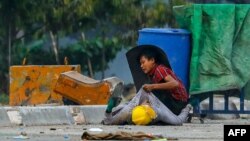Campaign group Fortify Rights and 16 Myanmar nationals have filed a genocide and war crimes complaint against Myanmar’s military leaders in Germany in the latest bid to leverage the principle of universal jurisdiction against the country’s generals.
Fortify Rights announced the case Tuesday in Thailand, which shares a long and porous border with Myanmar, and says a 215-page complaint was filed with Germany’s federal public prosecutor on January 20. The prosecutor’s office must now decide whether to open an investigation.
The prosecutor’s office confirmed receipt of the complaint in an email to VOA but declined further comment.
Universal jurisdiction holds that some crimes, including genocide, are so heinous they transcend national borders and that they and their perpetrators can be tried anywhere.
Fortify Rights CEO Matthew Smith said Germany has some of the most comprehensive laws covering universal jurisdiction in the world and already is handling more than 100 such cases.
His said his group’s complaint, “provides new evidence that the Myanmar military systematically killed, raped, tortured, imprisoned, disappeared, persecuted and committed other acts that amount to genocide, crimes against humanity and war crimes in violation of German law.”
“The complaint includes evidence showing that senior military junta officials exercised superior responsibility over subordinates who committed crimes, and that those officials knew about their subordinates’ crimes and failed to take any action to prevent the crimes or to punish the perpetrators,” Smith added.
He told VOA the complaint’s targets include junta leader Min Aung Hlaing but would not identify the rest. He said they included “members of the Myanmar military and others.”
The complaint covers their alleged abuses, both against the country’s ethnic minority Rohingya in 2016 and 2017 and against the broader population since the military toppled a democratically elected government in February 2021.
The United States and others have accused the military of genocide over its treatment of the Rohingya after a 2017 wave of murder, rape and arson that drove more than 700,000 of the mostly Muslim group to neighboring Bangladesh. Rights groups say the police and military also have killed thousands of civilians across the country since the coup in their bid to put down an ongoing armed resistance and civil disobedience movement to the junta’s rule.
Myanmar’s military rulers have denied wrongdoing. They say the military’s activities in 2016 and 2017 were legitimate counter-insurgency operations and that it has been using proportionate force since the coup against “terrorists” to restore peace and order.
Fortify Rights says the mixed makeup of the complainants reflect the breadth of abuse. About half are Rohingya; the rest come from some of the country’s many other ethnic groups, including the Arakan, Chin, Karen, Karenni, Mon and majority Burmans.
One of the Rohingya, a woman identified only as F.K. for her safety, claims to have survived an attack on her village in 2017 by soldiers and others under their control. According to the complaint, she says she saw them beating, stabbing and killing her neighbors and burning their homes, and heard them raping her daughter-in-law in an adjacent room.
“We [are counting] on the judiciary in Germany to open an investigation. This is the time to end the perpetrators’ impunity to ensure that they no longer get away with their crimes,” said Nickey Diamond, a Burmese complainant who fled the post-coup violence and now lives in Germany.
“If we do not act, serious crimes go unpunished, the perpetrators even repeat their crimes,” he said at the announcement of the complaint via video link.
In addition to interviews with hundreds of alleged abuse survivors and witnesses, Fortify Rights says the complaint, which comes with more than 1,000 pages of supporting material, includes information and leaked documents from military and police deserters and other sources.
The rights group says it also fills “gaps” in other cases against the military already underway at the International Court of Justice and International Criminal Court and in another universal jurisdiction case in Argentina. All three focus on the military’s alleged crimes against the Rohingya before the coup. The ICJ holds only states, not individuals, criminally responsible. Argentina’s courts, unlike Germany’s, said Smith, do not prescribe punishment specifically for genocide.
In yet another universal jurisdiction case, Turkey’s public prosecutor’s office is investigating Myanmar’s military for crimes against humanity over the alleged torture of prisoners, in the first case filed against the junta for alleged crimes committed since the 2021 coup.
None of the accused in any of those cases or in the complaint just filed in Germany are in custody. But Smith is hopeful that could change if and when Germany’s public prosecutor decides to launch an investigation.
“Ultimately the objective is for the German authorities to issue arrest warrants, and in the event that that happens, things such as extradition to Germany become very real,” he said. “This will send a message to members of the Myanmar military junta and others that are responsible for crimes in Myanmar that they’re not safe, they’re not safe to travel in our world.”







